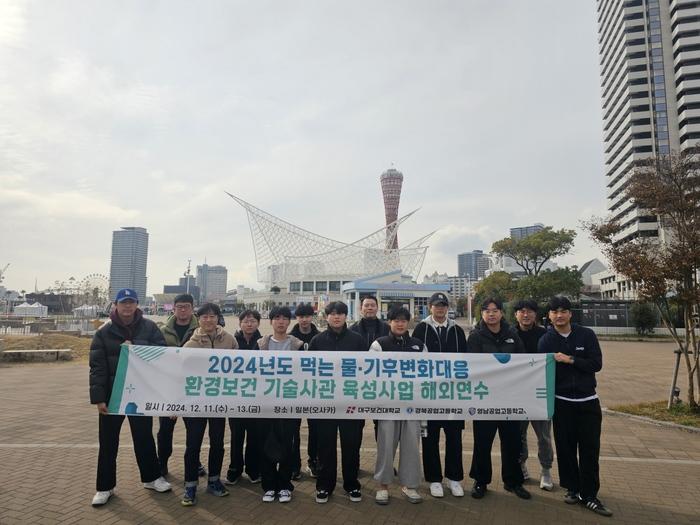▲ 환경보건기술사관 육성사업 해외연수 (C) 대구보건대
【브레이크뉴스 대구】진예솔 기자=대구보건대학교는 환경보건학과가 일본 고베·오사카 지역에서 해외연수 프로그램을 진행했다고 18일 밝혔다.
먹는물·기후변화 대응 환경보건 기술사관 육성사업단은 지난 11일부터 13일까지 경북공업고등학교 디스플레이화학공업과와 영남공업고등학교 바이오화공과 3학년 재학생 9명을 대상으로 해외연구 프로그램을 실시했다.
이번 프로그램은 환경문제 해결을 위한 첨단 기술과 지속 가능한 사회 구현 사례를 체험하고 글로벌 환경 인재로 성장할 기회를 제공하기 위해 마련됐다.
학생들은 연수 기간 동안 철강, 화학, 제조업 등 중공업이 발달한 산업 거점지에서 환경 문제 해결을 위한 선도적 기술을 갖춘 도시 고베와 오사카를 방문해 자원 순환과 친환경 기술의 실제 사례를 학습했다.
고베시 에코팜에서는 농업 폐기물과 하수 슬러지를 활용한 바이오가스 생산 과정을 직접 관찰하며 순환형 에너지 모델의 가능성을 배웠다. 오사카의 하수슬러지처리장과 리사이클 시스템즈는 각각 대규모 도시에서 발생하는 폐기물을 자원으로 전환하고, 재활용품으로 재가공하는 대표적 사례로, 자원 순환의 중요성과 환경 문제 해결 방안을 체감할 수 있었다.
프로그램에 참여한 경북공업고등학교 3학년 김지원 학생은 “이번 연수는 자원 재활용이 단순한 선택이 아닌 필수임을 깨닫게 해준 경험이었다”며 “미래에 환경 문제 해결을 위해 기여할 수 있는 전문가로 성장하고 싶다”고 소감을 밝혔다.
영남공업고등학교 윤건영 부장은 “이번 연수는 일본의 선진 환경기술과 지속 가능성의 가치를 체험하며 국제적 협력의 중요성을 배울 수 있는 뜻 깊은 시간이었다”고 전했다.
김지훈 기술사관 육성사업단장(환경보건학과 학과장)은 “학생들이 이론을 넘어 실제 현장에서 환경기술의 가치를 배울 수 있었다”며 “앞으로도 해외 연수를 지속 확대해 글로벌 환경 인재를 양성하고 기술사관 육성사업의 성과를 높여가겠다”고 밝혔다.
Daegu Health College announced on the 18th that its Department of Environmental Health conducted an overseas training program in the Kobe and Osaka areas of Japan.
The Drinking Water and Climate Change Response Environmental Health Technology Officer Training Group conducted an overseas research program for nine third-year students from the Display Chemical Engineering Department of Gyeongbuk Industrial High School and the Biochemical Engineering Department of Yeongnam Industrial High School from the 11th to the 13th.
This program was designed to provide opportunities to experience cutting-edge technologies for solving environmental problems and cases of implementing sustainable societies, and to grow as global environmental talents.
During the training period, students visited Kobe and Osaka, cities with leading technologies for solving environmental problems, in industrial hubs where heavy industries such as steel, chemicals, and manufacturing are developed, and learned about real-life cases of resource circulation and eco-friendly technologies.
At Kobe Eco Farm, they directly observed the biogas production process using agricultural waste and sewage sludge, and learned about the potential of a circular energy model. Osaka’s sewage sludge treatment plant and recycling systems are representative examples of converting waste generated in large cities into resources and reprocessing them into recyclables, respectively, allowing us to experience the importance of resource circulation and solutions to environmental problems.
Kim Ji-won, a third-year student at Gyeongbuk Technical High School who participated in the program, said, “This training was an experience that made me realize that resource recycling is not a simple choice but a necessity,” and added, “I want to grow into an expert who can contribute to solving environmental problems in the future.”
Yoon Geon-young, head of Yeongnam Technical High School, said, “This training was a meaningful time to experience Japan’s advanced environmental technology and the value of sustainability, and learn the importance of international cooperation.”
Kim Ji-hoon, head of the Technology Officer Training Program (Department of Environmental Health), said, “Students were able to learn the value of environmental technology beyond theory and in the field,” and added, “We will continue to expand overseas training to foster global environmental talent and improve the results of the Technology Officer Training Program.”
원본 기사 보기:브레이크뉴스 대구경북
$( document ).ready(function() {
var d = document;
var s=”script”;
var id = ‘facebook-jssdk’;
var js, fjs = d.getElementsByTagName(s)[0];
if (d.getElementById(id)) return;
js = d.createElement(s); js.id = id;
js.src=”http://connect.facebook.net/ko_KR/sdk.js#xfbml=1&version=v2.8″;
fjs.parentNode.insertBefore(js, fjs);
});

